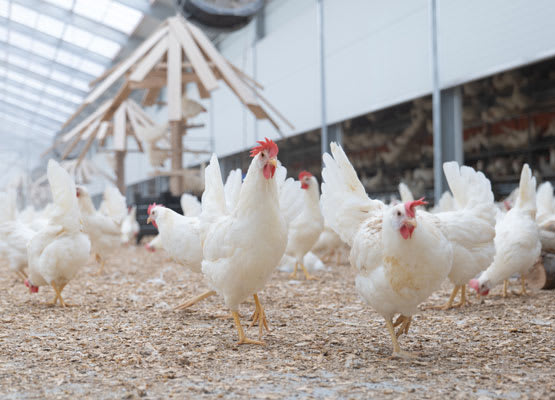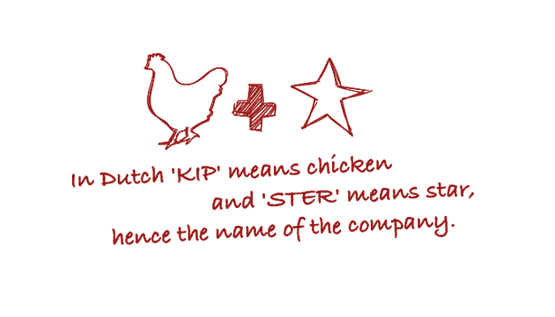- MPS Kroger Kipster
- MPS Kroger Kipster
America’s first CO₂ neutral eggs find the perfect pack
America's first carbon neutral eggs hit the shelves in Hartmann packaging
In early 2023, a progressive partnership between two of Hartmann’s longstanding customers put the first carbon neutral eggs on shelves in United States stores. Grocery store chain The Kroger Co. and egg producer MPS Egg Farms marketed the eggs under Kroger’s “Simple Truth®” brand and worked with Hartmann to supply the sustainable Hybrid egg packaging (only available at Hartmann North America). The eggs are produced in a sustainable, closed-loop system that’s environmentally conscious, rooted in animal welfare and 100% cage-free.
Going Dutch
The project began in 2019 when Kroger learned of a carbon neutral egg production model developed a few years ago by Kipster Farms in the Netherlands. They approached MPS, the 6th largest egg producer in the U.S., about joining forces to bring the concept to America. After intensive discussions and on-site visits in the Netherlands, construction work began - and since then, MPS has installed four new carbon neutral henhouses on one of its farms in North Manchester, Indiana.
Maximizing sustainability and efficiency

“The new MPS barns are more closely tuned to meeting hens’ needs than most commercial chicken houses in the U.S.”, says Sam Krouse, Vice President of Business Development at MPS. “While the Kipster model specifies barns with a slightly smaller footprint than a typical cage-free facility, they each have outdoor spaces, skylights and multiple garden areas so the hens can do what comes naturally”.
To reduce the eggs’ carbon footprint, the hens are fed a diet of repurposed bakery byproducts with additional nutrients, rather than conventional corn-based poultry feed. The chickens themselves are a white breed, which are much more efficient than the commonly used brown hens at turning feed into eggs.
Helping close the sustainability loop, the barns are powered by solar panels - and MPS has implemented a practice already used in its conventional and cage-free chicken houses: all the manure is gathered and dried with exhaust air from the barns to make an organic fertilizer with a much lower carbon footprint than the man-made nitrogen compounds.
A carton that ticks all the boxes
Asked why they chose Hartmann’s Hybrid egg carton, Sam Krouse said, “Kipster is a unique egg with a lot to shout about. The Hybrid carton gives us the space to create a beautiful and informative carton design. It also has the advantage of being made from 100% recycled materials - a critical requirement of Kipster’s environmentally friendly brand and Kroger’s mission to create more sustainable food systems.”
The Hybrid carton is a next-generation pack for the specialty egg segment, and we at Hartmann are honored that it’s been chosen for this major new brand. It breaks from tradition by blending a beautiful paperboard top with a traditional moulded fibre bottom – and its recyclability, compostability, and biodegradability make it a great complement to this initiative.
The Hartmann Hybrid Packing is available for sale in North America only.

Kinder to hens, kinder to the planet
Kroger collaborates with Kipster, a Dutch innovator that has revolutionized egg farming, in order to bring humane and sustainable farms to the U.S. The Kipster system in short:
- Uses the highest standards of animal welfare, providing a cage-free, natural-like wooded environment with plenty of variety, daylight, and outdoor foraging space
- Uses chicken feed made of surplus food from bakeries and other food producers, with lower climate impact than standard feed
- Minimizes fine particle emissions, resulting in better air quality for farmers and animals
- Powered by rooftop solar panels
“We achieve carbon neutrality by first reducing greenhouse gas (GHG) emissions internally as much as possible. Any remaining emissions are then offset by supporting external carbon reduction projects,” says Kipster’s Managing Director for the U.S., Sandra Vijn.
The eggs’ CarbonNeutral® product certification means that Kipster is following the CarbonNeutral Protocol in a clear, transparent, and credible manner. All egg cartons bear the logo that helps shoppers identify and find the product on the shelf. Eggs are certified according to “The CarbonNeutral Protocol” which is managed by Climate Impact Partners.
Click here to find more details about CarbonNeutral® product certification.
About MPS Egg Farms
MPS is a 6th generation family-owned business based in North Manchester, Indiana, with farms in Indiana, Illinois, Texas, and Georgia. They’re the 6th largest egg producer in the U.S., being an active member in the United Egg Producers and American Egg Board. Caring for their hens, people, community, and environment is their number one priority. In the product partnership with Kroger and Kipster, MPS’s role is to build the hen houses and run the farm while Kipster owns the concept, brand, and marketing. In 2021, MPS started building the first production facility featuring the proprietary Kipster system, eggs first hit Kroger’s shelves in November 2022, and the expansion continues.
About Kipster
Kipster is a progressive, award-winning Dutch egg farmer. In 2017, they introduced the world’s first carbon neutral egg to the Netherlands. They dream of a sustainable and healthy world in which all people and animals can share the planet and live with dignity. Kipster’s mission is to find ways to feed the world population in an honest way, with respect for all living things, and without passing the cost on to future generations.
Since launching, Kipster has remained committed to full transparency, opening its Dutch farm to visitors, and freely sharing information about its model to drive greater sustainability across animal protein production.

About the Kroger Co.
Headquartered in Cincinnati, Ohio, The Kroger Co. is one of the largest retailers in the United States. They operate 2,750 grocery retail stores under a variety of banner names. Their formats include supermarkets, seamless digital shopping options, price-impact warehouse stores, multi-department, and jewelry stores. Kroger also operates 35 food production or manufacturing facilities producing high quality private-label products. Apart from that they run supermarket fuel centers and pharmacies - all providing high quality services and value for over 11 million customers daily.
Supporting Kroger’s green journey
Hartmann partnered with Kroger in 2009, servicing only one small division as a “trial”. By 2021, Kroger was Hartmann’s largest retail customer in North America, and sales have snowballed every year since. This achievement recognizes both Hartmann’s and Kroger’s commitment to maintaining initiatives that drive the conversion to moulded fibre packaging and create a more sustainable future for our planet.
In 2020, Kroger announced a series of sustainable packaging goals, focused on recycled content and recyclability, compostability, carbon emission reduction, and general reduction of single-use plastics and food waste. Furthermore, Kroger decided to convert their US store-branded egg cartons, previously manufactured with polystyrene foam, to moulded fibre instead. Hartmann was the largest contributor to this conversion and is proud to be helping Kroger to meet their sustainable packaging goals.
“Simple Truth® is excited to partner with the innovative team at Kipster to further elevate our brand’s purpose to be a force for good. These Simple Truth® and Kipster eggs will be produced in a closed-loop system that aligns with the highest health and welfare standards for people and animals. And Hartmann’s Hybrid egg carton is a perfect match. It’s sustainable and offers plenty of space for product information.”
Brad Studer, Senior Director, Our Brands for Kroger
Saving the planet with a little help from our feathered friends
27 February 2023
How the egg market coped in 2020 and what we can look forward to in the near future.
24 March 2021
How retailer REWE says "nein! zum Kükentöten" (no! to chick culling) on a new designed carton for their private label of barn eggs.
10 November 2021